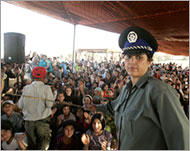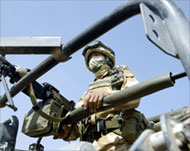Clashes kill 11 ahead of Afghan vote
Eleven people have been killed in guerrilla clashes on the eve of elections in Afghanistan, but UN organisers said they were confident voting could be held across the country in spite of Taliban threats.

Enthusiasm among Afghans to vote in their first free legislative elections in more than 30 years has been high and the commander of US forces in the country predicted a record turnout of the 12.5 million registered to vote.
Lieutenant-General Karl Eikenberry said that Taliban insurgents would not hesitate to attack election workers or voters to try to disrupt the ballot but that they would not succeed.
“Tomorrow that election is going to go. There will be some violence, but it’s going to go,” he told Reuters in an interview.
Democracy v. rule of the gun
A high turnout would be a boost for the US administration, allowing it to portray Afghanistan as a success to set against the gloom from Iraq and Hurricane Katrina.
The top UN official in the country said the elections signalled the emergence of a new political culture and showed that war-torn Afghanistan could resist the rule of the gun.
 |
|
Insurgents have attacked election |
Jean Arnault, the UN secretary-general’s special representative, condemned violence – in which seven candidates and six poll workers have died as well as many members of the security forces – but told a news conference the militants had failed to disrupt preparations.
“We are very confident that those extremists will also fail to disrupt and derail polling day tomorrow,” he said.
The Taliban tried to disrupt October’s presidential election, won by US-backed candidate Hamid Karzai, when more than eight million people turned out to vote.
Guerrilla attacks
The Taliban have called on Afghans to boycott Sunday’s poll for a national assembly and councils in 34 provinces and warned they could be caught up in attacks on foreign troops.
Overnight guerrilla attacks underlined the threat.
 |
|
Security has been tightened |
Four police officers were killed and two wounded when guerrillas ambushed a police patrol south of Kabul overnight, while seven guerrillas were killed after they ambushed a police convoy in Zabul, a southern hotbed of militant activity, police said.
More than 1000 people have been killed in militant violence this year – most of them guerrillas, but also 49 US troops – the bloodiest period since US-led forces overthrew the Taliban in 2001 for failing to give up 11 September mastermind Osama bin Laden.
One candidate from among more than 5800 standing was killed this week and another wounded, but there has been no dramatic rise in violence in recent days.
Security tightened
Security has been stepped up throughout the Muslim country with about 100,000 troops, including Eikenberry’s force of 20,000 and 10,000 NATO-led peacekeepers, guarding voters who will cast their ballots at 6000 polling centres.
|
“Tomorrow that election is going to go. There will be some violence, but it’s going to go” Karl Eikenberry, |
Neighbouring Pakistan has tightened security along its long, porous border with Afghanistan to prevent militants crossing to disrupt the elections.
Pakistani authorities stopped cross-border traffic and about 50 new border checkpoints were set up to “plug all possible infiltration routes”, a Pakistani security official said.
Afghanistan’s second city, Kandahar, the birthplace of the Taliban and the scene of repeated militant attacks, was virtually deserted. All traffic was ordered off the streets until Sunday evening, after voting finishes.
Intimidation campaigns
Most shops and businesses were closed, and election workers were busy preparing polling centres. Additional police officers and soldiers patrolled the streets, and sniffer dogs trained to detect explosives checked vehicles entering the main counting centre.
While enthusiasm has been high for the elections, rights groups have expressed concern about intimidation by warlords who have been allowed to stand, as well as by militants.
Analysts have questioned whether parliament will be more of a help or a hindrance, given that the election, being fought on non-party lines, is expected to produce a fragmented assembly with politicians focusing on local not national interests.
Eikenberry said the vote would be a big step forward, but he stressed the need to move ahead with post-war reconstruction and the building of security forces and the justice sector, as military activity alone was not enough to defeat the insurgency.
Provisional results are expected by 10 October and final results by 22 October, but it is expected to be several months before the assembly meets in the old parliament building being renovated.